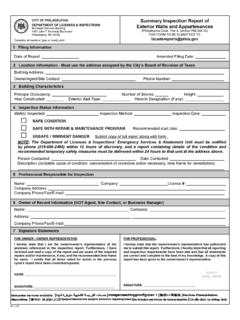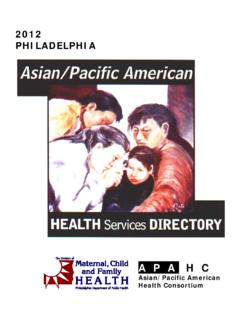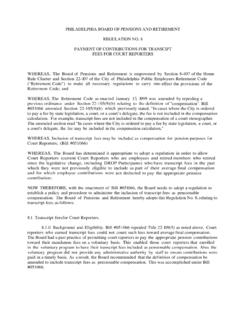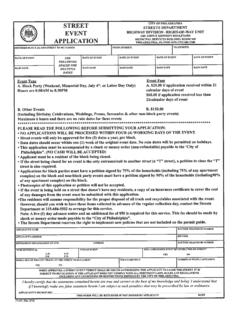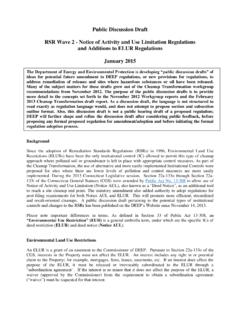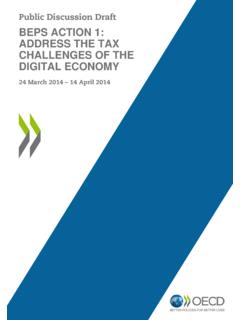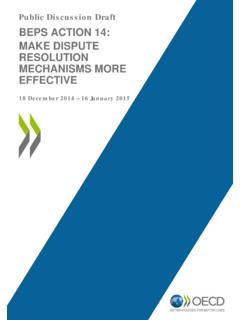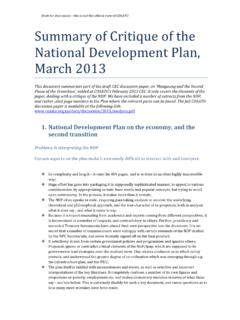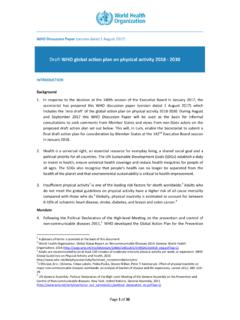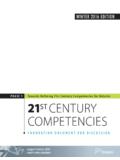Transcription of DRAFT - phila.gov
1 DRAFT 4/16/2018 MAYOR S TASKFORCE ON EVICTION PREVENTION AND RESPONSE DRAFT REPORT AND RECOMMENDATIONS APRIL 2018 DRAFT DRAFT 4/16/2018 Contents NOTE ON THIS DRAFT DOCUMENT .. 3 Executive Summary .. 4 Letter from the Task Force Co-Chairs .. 6 Scope of the Task Force .. 7 Eviction Defined .. 7 Why Eviction Prevention Matters .. 7 Causes of Evictions .. 8 Other Factors Impacting the Eviction Process .. 9 Landscape of Evictions in Philadelphia .. 10 Legal Processes and Protections .. 13 The Process of Eviction .. 13 State Laws and Rules Related to Eviction .. 17 The Fair Housing Ordinance and the Fair Housing Commission .. 17 Legal Requirements .. 18 Existing Supportive Services .. 19 Model Resources and Support Services .. 21 Challenges Identified .. 22 Recommendations .. 24 Moving Forward: Implementation, Monitoring, and Evaluation.
2 32 Appendices .. 34 Appendix I: Task Force Members .. 34 Appendix II: Compiled Task Force Metrics .. 34 Appendix III: Landlord and Tenant Responsibilities Required by Law and Policy .. 35 Appendix IV: Summary of Existing Eviction Services .. 37 Appendix V: Philadelphia Eviction Prevention Project Summary .. 38 Appendix VI: Task Force Mandate .. 39 Appendix VIII: List of Acronyms Used .. 42 Appendix IX: Glossary of Terms .. 42 3 DRAFT 4/16/2018 NOTE ON THIS DRAFT DOCUMENT Below is the public DRAFT of the report from the Mayor s Task Force on Eviction Prevention and Response, including information about the local eviction landscape and recommendations on how to reduce evictions in Philadelphia. We are hoping that the public can provide comment on this DRAFT by 5 pm on Friday, May 11th. Following the inclusion of the public comment, the final DRAFT will be delivered to Mayor Kenney in June.
3 Feedback on this DRAFT can be submitted to We also encourage attendance at the Public Comment Session on Tuesday, May 8, 5:30-7:30, 1401 JFK Blvd Suite 1450. Thank you in advance for your thoughtful response to this DRAFT report. 4 DRAFT 4/16/2018 Executive Summary Like many cities across the nation, Philadelphia is currently suffering from an eviction crisis. Evictions are involuntary residential moves initiated by property owners or managers due to the non-payment of rent, lease violations, end of a lease term, or other breakdowns in the contract between landlord and tenant. Last year in Philadelphia, over 24,000 eviction filings were recorded, representing roughly one in 14 tenants who had eviction filing against them. This does not include illegal evictions, which include forced moves by tenant harassment or illegal landlord practices.
4 Studies from other cities indicate that this number could be double the number of formally filed evictions. Research shows that eviction is not only a symptom of poverty, but also a root cause. It disproportionally affects women of color with children, and results in great economic burdens on both landlords and tenants. It breaks up communities, hurts prospects for future employment and housing, and increases the need for homeless services. In short, eviction negatively affects everyone involved in the process and the city more broadly. The Mayor s Task Force on Eviction Prevention and Response was established by Major Jim Kenney in September of 2017. The Task Force consists of twenty-two appointed members with expertise in housing and landlord tenant issues, including representation from property owners and managers, tenants, academics and think tanks, community advocates, and City government.
5 The Task Force also received input and ideas from over 150 individuals through focus groups, community forums, and stakeholder interviews. Over the last seven months, the Task Force has assessed the Philadelphia eviction landscape and best practices from across the country to identify seventeen recommendations in the following areas: Education and Outreach, Resources and Supports, Housing Standards and Enforcement, and Legal Process and Policies. These areas need to be addressed to end the eviction crisis in Philadelphia. The Task Force recommends the following: Outreach and Education 1. The City should create a single portal for access to eviction prevention services. The capacity of existing housing counselors and of the Tenant Referral Help Line should be expanded. 2. The City should conduct a public education campaign about eviction and about safe, habitable housing.
6 The campaign should focus on increasing knowledge of rights and responsibilities of tenants and landlords, and encouraging the use of available resources. 3. Direct outreach to tenants with an eviction filing should be increased. The intent of this outreach is to make sure tenants are aware of the eviction filing, the court date, and available resources. Resources and Supports 4. The City should seek and preserve funding for a program to enable small landlords (those who own fewer than four rental units) to get low-interest loans to make necessary repairs to their properties, ensuring good quality affordable housing for tenants. 5. Philadelphia should run a pilot to replicate HomeBase, New York s targeted homelessness prevention program. This emergency homelessness prevention program would deploy existing funding for short-term or long-term housing subsidy.
7 6. The City should develop a pre-complaint resolution meeting process. This would allow tenants and landlords to engage in a fair and productive conversation prior to the filing of an eviction 5 DRAFT 4/16/2018 complaint, providing an opportunity to negotiate issues such as repayment of rent without an eviction on the record, and without legal costs for either party. 7. The City, the Municipal Courts, and the Fair Housing Commission should share data with non-profit partners so the non-profit partner can develop a database with publicly available information about landlords and rental properties. Housing Standards and Enforcement 8. The City should expand the use of data analysis to identify properties being rented without licenses. By using predictive models, the City can pinpoint the location of suspected unlicensed rental units.
8 9. The City should explore code changes to make enforcement against problematic landlords more efficient and effective, based on further study of best practices nationwide. 10. L&I and the City Law Department should expand their pilot program for inspection of and enforcement against the most problematic landlords. Legal Process and Policies 11. City Council should pass Good Cause Eviction legislation. Good Cause evictions require landlords to provide a just or good reason prior to evicting tenants. This legislation would seek to stop evictions due to reasons of discrimination and 12. The City should increase enforcement of requirements related to key rental documents. The City should increase oversight to ensure that current laws around licensing and housing quality are being met. 13. Municipal Court should set up a mandatory, pre-hearing mediation process.
9 The intent of this process would be to give landlords and tenants time to consider their options and consult with housing counselors, before having to make important financial commitments. 14. The City should increase legal representation for low-income tenants. This would include expanding resources for legal representation from legal aid organizations attorneys, as well as working with non-profit partners to expand recruit of volunteer lawyers. 15. The City should increase supports and provide funding for people forced to move as a result of Sheriff s Sales. This would include providing funding for moving costs and new security deposits, expanding the use of sequestration to divert tax liened properties, as well as ensuring that tenants have an adequate notice to find alternative housing. 16. The City should work with the Municipal Court to expunge eviction filings and judgments.
10 This would decrease discrimination against tenants who have previously had an eviction filing. 17. The City should work with the Municipal Court to ensure that the Court and the mediation process are accessible to individuals who are unfamiliar with the court process. The Task Force will present these recommendations to Mayor Jim Kenney and City Council for review and discussion. Once finalized, the implementation of these recommendations will assist in reducing eviction in Philadelphia. Relevant agencies, providers, and stakeholders have already been identified in the implementation of many of these recommendations. Solving the eviction crisis in Philadelphia through these recommendations will keep Philadelphians safe, supported, and able to fully participate in the city s growth. 1 This recommendation was not unanimous, but reflects the majority of task force members.
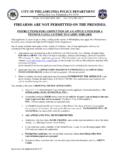
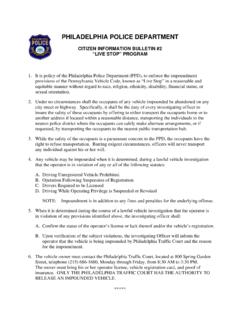
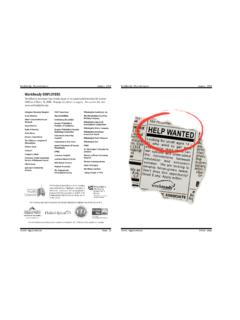
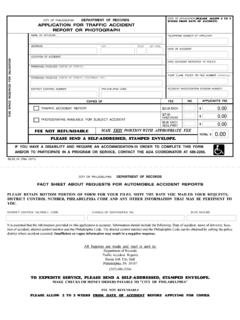
![[PSA] Philly: Classaction lawsuit brings changes in …](/cache/preview/1/4/c/8/8/d/5/c/thumb-14c88d5c5b2f1fee5e561fc7daceb397.jpg)

